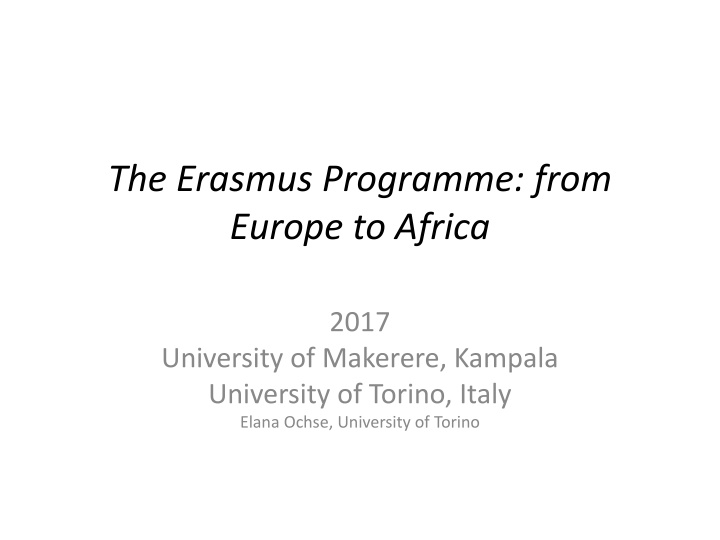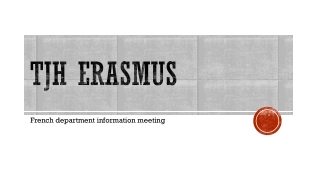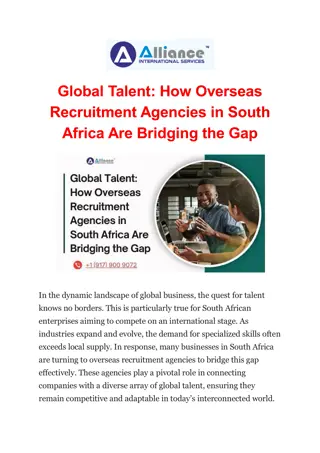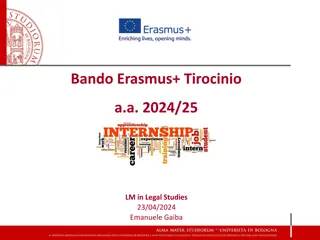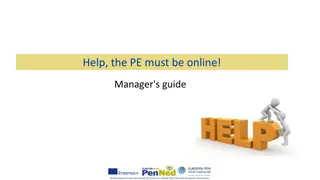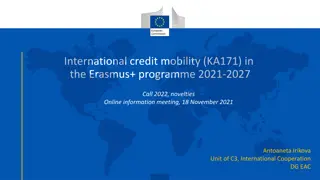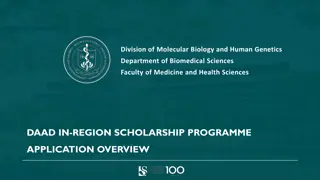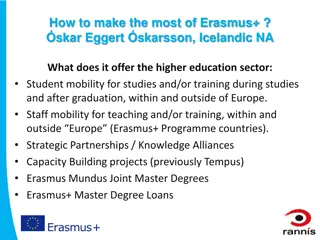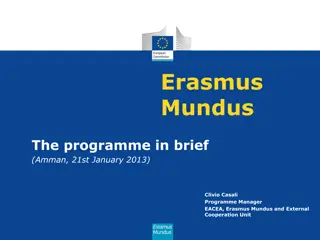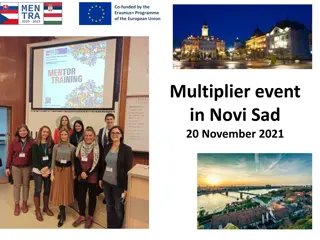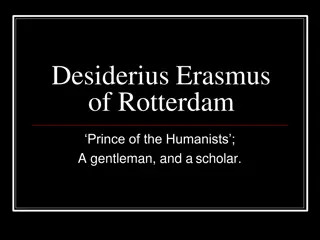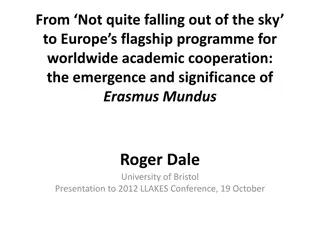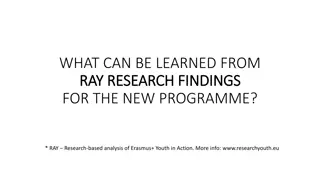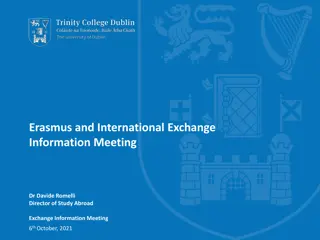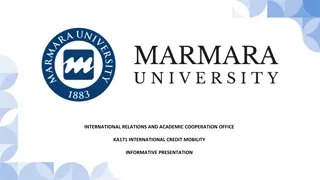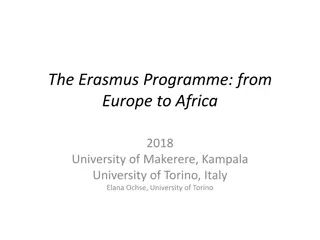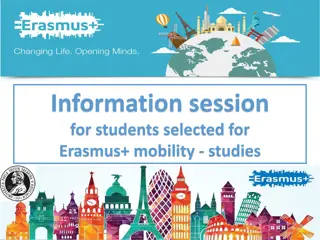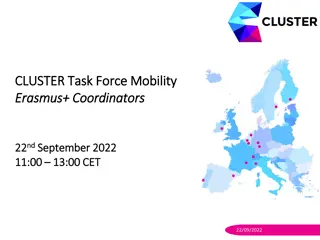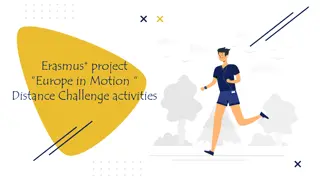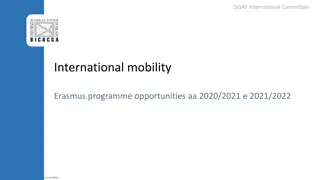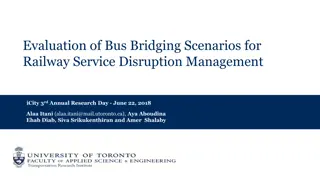The Erasmus Programme: Bridging Europe and Africa Through Education
The Erasmus Programme facilitated a meaningful exchange between the University of Makerere in Kampala and the University of Torino in Italy in 2017. Desiderius Erasmus, a prominent figure in education history, believed in the transformative power of education. The Erasmus Project aims to reduce unemployment, promote adult learning, encourage democratic participation, support innovation, and enhance cooperation with EU partner countries.
Download Presentation

Please find below an Image/Link to download the presentation.
The content on the website is provided AS IS for your information and personal use only. It may not be sold, licensed, or shared on other websites without obtaining consent from the author.If you encounter any issues during the download, it is possible that the publisher has removed the file from their server.
You are allowed to download the files provided on this website for personal or commercial use, subject to the condition that they are used lawfully. All files are the property of their respective owners.
The content on the website is provided AS IS for your information and personal use only. It may not be sold, licensed, or shared on other websites without obtaining consent from the author.
E N D
Presentation Transcript
The Erasmus Programme: from Europe to Africa 2017 University of Makerere, Kampala University of Torino, Italy Elana Ochse, University of Torino
Image result for logo European Union vettoriale Image result for logo universit di torino vettoriale
Introduction Erasmus today
Desiderius Erasmus, a.k.a. Erasmus of Rotterdam (1469 1536)
Erasmus A Catholic priest: ordained to the priesthood in April 1492 Started his studies at the University of Paris The wandering scholar: Paris, England, Italy, Holland Doctorate in Divinity from the University of Torino in 1506
Erasmus (2) Enormous faith in the power of education. With strenuous effort human nature could be molded, so as to draw out peaceful and social dispositions while discouraging unworthy appetites. In brief, Erasmus believed that one is what one reads.
Erasmus (3) Encyclopaedia Britannica: Erasmus was: a humanist who was the greatest scholar of the northern Renaissance, the first editor of the New Testament an important figure in the study of classical literature. A precursor to the Lutheran Reformation and the Catholic Counter-Reformation In brief, a scholar with an independent stance in an age of fierce confessional controversy
The Erasmus Project: Aims Reduce unemployment, especially among young people Promote adult learning, especially in the new skills Encourage young people to take part in European democracy Support innovation, cooperation and reform Reduce early school-leaving Promote mobility and cooperation with the EU s partner countries
The Erasmus Student Exchange Programme When? 30 years ago (1987) Why? provide foreign exchange options for students from within the European Union Who? Students and teaching staff from universities and seats of learning on the European continent. How many? Over 4000 individuals involved in the programme at any one time
New Erasmus + Annual budget: 2 billion Euros per year Duration: 2014 2020 Who can apply? Local and Regional authorities, Schools, Corporations, Training centres, Administrations, States, Universities, Non-profit organisations Regions: European Union, Candidate countries, New Independent States, European Economic Area, Mediterranean countries, Switzerland, Worldwide, Balkans
Erasmus Partner Countries Region 11 ACP = Africa, Caribbean and the Pacific Angola, Antigua and Barbuda, Bahamas, Barbados, Belize, Benin, Botswana, Burkina Faso, Burundi, Cameroon, Cape Verde, Central African Republic, Chad, Comoros, Congo, Congo - Democratic Republic of the, Cook Islands, Djibouti, Dominica, Dominican Republic, Equatorial Guinea, Eritrea, Ethiopia, Fiji, Gabon, Gambia, Ghana, Grenada, Guinea, Guinea-Bissau, Guyana, Haiti, Republic of C te d'Ivoire, Jamaica, Kenya, Kiribati, Lesotho, Liberia, Madagascar, Malawi, Mali, Marshall Islands, Mauritania, Mauritius, Micronesia- Federated States of, Mozambique, Namibia, Nauru, Niger, Nigeria, Niue, Palau, Papua New Guinea, Rwanda, Saint Kitts And Nevis, Saint Lucia, Saint Vincent And The Grenadines, Samoa, Sao Tome and Principe, Senegal, Seychelles, Sierra Leone, Solomon Islands, Somalia, South Sudan, Sudan, Suriname, Swaziland, Timor Leste - Democratic Republic of, Tanzania, Togo, Tonga, Trinidad and Tobago, Tuvalu, Uganda, Vanuatu, Zambia, Zimbabwe.
University of Torino + Makerere 2016-2018: Budget of almost 53,000 euros (to be used over a two-year period) Mobility of 4 students (2 x PhDs and 2x MAs) and two teaching staff members from Makerere University. Mobility of two teaching staff members from the University of Torino. This year Prof Cecilia Pennacini and Elana Ochse. 224 million Ugandan shillings
Other UniTO exchange projects TeachMob, organised by UniTo with the aid of a national banking group (1) WWS (Worldwide Style), also organised by Unito (2) 1) Dr Godfrey Asiimwe (2016) African History and Development 2) Anthony Mugeere and Netsanet Gebremichael (2015): doctoral students
University of Torino + Makerere (2) 2018-2020: Budget of over 76,000 euros Mobility from Makerere to Torino 5 students (PhD and Master s) 1 non-teaching staff member 2 teaching-staff member Mobility from Torino to Makerere 1 non-teaching staff member 2 teaching-staff members 320 million Ugandan shillings
